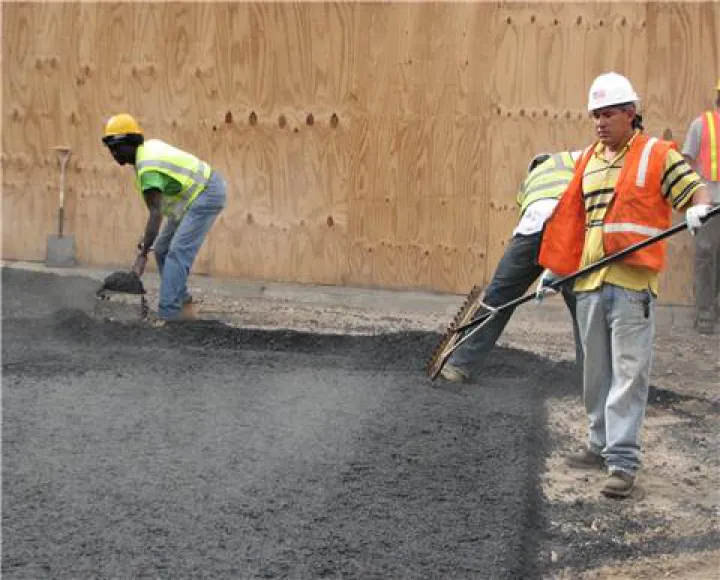
The basic concrete mix consists of Portland cement, sand, gravel and water. Additional ingredients can also be added to this mix to change its properties. Adding steel makes it reinforced concrete. Concrete is strong in compression which means it can support weight but tension from push and pull can easily make it crack. The water to cement ratio is carefully monitored by the engineer and supervisor to ensure the quality of the concrete in both strength and tension resistance by performing the slump test and the cylinder compression test. There are different types of concrete such as slab-on-grade, footings, and stairs. There are also ramps, curbs, sidewalks, and driveways.
Our services include all phases of asphalt and concrete paving such as asphalt resurfacing, asphalt milling and paving, asphalt services and construction, concrete sidewalks, excavation, demolition, playgrounds, playing fields and running track construction, parking lot and roadway construction, and general site work. Our company is an approved paving contractor by the New York City Dept. of Transportation and we are fully insured and bonded.
MILLING
Milling is a roadway reconstruction process, known as asphalt or concrete milling, in which a large capacity grinder cuts the top layer of a surface from its base. Reconstruction of roadways demands asphalt milling machines to grind up asphalt from damaged road surfaces, to be recycled, while the exposed concrete base is resurfaced with new asphalt, and then rolled and compacted to a smooth and even finish.
When the top pavement is ground up by a milling machine, it is transported to an asphalt or concrete plant where it can be incorporated into new pavement, or recycled to form the base or sub-base for new pavement.
The milling process takes planning, equipment, and testing. It involves the transportation of mixture and unloading. The mixture is also tested for density and smoothness in accordance with regulation standards.
When constructing a new site, excavation is required to ensure the proper soil compaction and correct elevation of the land. The scale of the excavation job varies from digging soil material to implement the foundation for a small building to moving millions of cubic yards of earth. For procedures such as digging, grading, tunneling, trenching, and drilling, a soil excavation permit has to be approved before any construction is done.
Excavation can include services in grading, water and sewer lines, site development, topsoil and dirt removal, shrub and tree removal, and even rock removal.
During excavation, machines called diggers or excavators, remove lose earth and topsoil from the ground. Other equipment used are scrapers and pans, bulldozer, front-end loader, compaction equipment, hydraulic excavators, and backhoe loaders.
Project planning is essential in order to avoid water damage during excavation. Heavy rain can cause the site work to become muddy.
There are two types of paving: pavement constructing and pavement resurfacing. They include flexible pavement or Superpave Hot Mix Asphalt (HMA), composite pavement or Stone Matrix Asphalt (SMA), and rigid pavement or Portland Cement Concrete.
Pavement life is affected by the number of heavy load stress. Research is conducted to assess the life cycle of the type of pavement based on cost, safety, climate, and durability to determine the material used for the pavement.
Pavement resurfacing and overlay can also help maintain asphalt driveways that have cracks and potholes as a result of weather exposure. Crack sealing can help extend the life of driveways but pavements with extensive cracks will not benefit from seal coating and pavement resurfacing will have to take place.
We work with many schools to install and resurface playgrounds and courtyards. It requires us to pour concrete, assemble equipment, install fencing, and make sure safety is inspected.
Parking lots that are under-engineered get re-stripped and re-paved to integrate the parking space according to the landscape irrigation for storm water discharge. We comply with regulations for stall size, layout, configuration, quantities, and handicapped accessibility.
Our project management and experience allow us to provide quality service to general contractors who have site construction, engineering, and reconstruction projects.
Site work involves understanding in soil stabilization and geology. It includes excavation, piping, retaining walls, paving, parking lot reconstruction, and landscaping. We have complete site work services to help contractors complete their projects.
A dry well is a shaft or chamber constructed in the ground to collect drainage like unwanted storm water runoff by dispersing it into the ground. It is built to resist collapse and clogging and keeps storm drains from overloading.
A dry well sometimes consists of a pump-like plastic barrel for collecting the inflow of water from the surface and releasing the outflow of water from its capacity to the earth on the ground. This prevents a walkway from being wet and slippery in the spring. In the fall, the dry well prevents the pavement from ruptures due to the formation of ice.